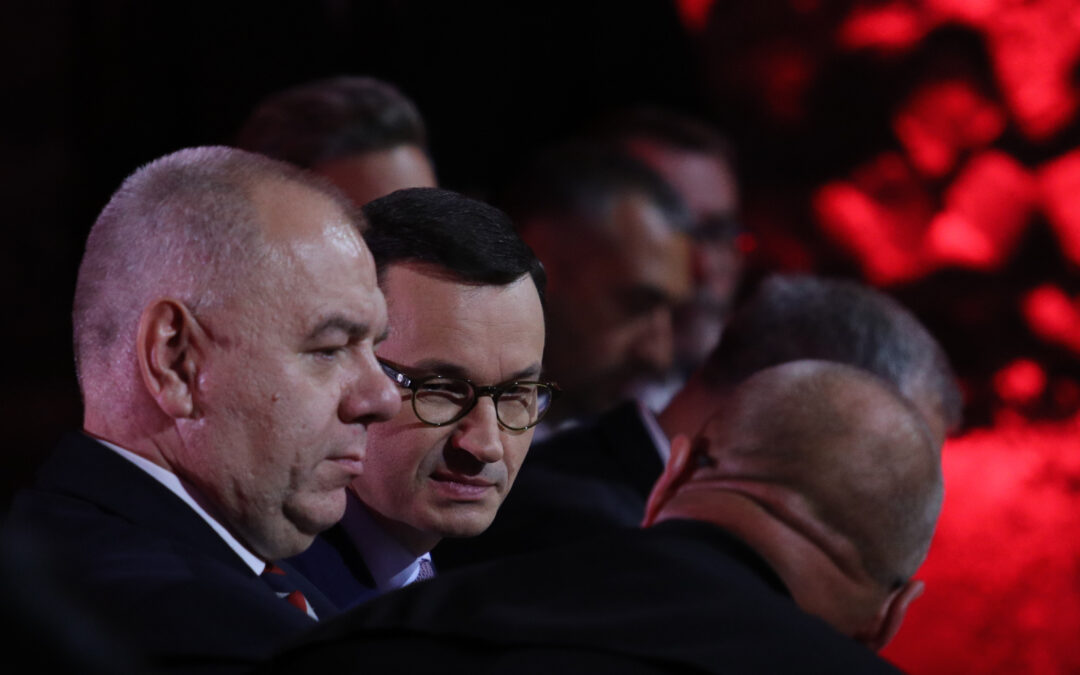By Marcin Makowski
“It’s a farce,” a US official told me, commenting on the development minister’s firing. “Nowak has only just been at meetings with high-ranking officials, securing collaboration and contracts – and a moment later he’s out of the government.”
He was referring to yesterday’s sudden dismissal of Piotr Nowak, the development minister, after he stepped out of line by announcing that the EU funds would be unblocked. Yet the billions of euros at stake were only the ostensible reason for his removal.
Behind the political scenes, Prime Minister Mateusz Morawiecki’s game was about maintaining influence and the balance of power. By removing Nowak, Morawiecki took away from his rival in government, deputy prime minister Jacek Sasin, his most promising ally.
Nowak earlier this month visited Washington for talks with US Trade Representative Katherine Tai and Secretary of Commerce Gina Raimondo, including over a proposal for Poland to replace Russia in the G20. He had only been in his position for five months before being fired.
“I wonder what the Americans will think now about how serious Poland is in business negotiations?” asks the US official.
A strange dismissal indeed, but one that an attentive observer of the background of the personnel games played out in the United Right – Poland’s ruling coalition – could have foreseen for at least a month.
When Morawiecki said yesterday, in explaining Nowak’s dismissal, that “the form of cooperation” agreed with the minister had been “exhausted” at a press conference yesterday, that made this even clearer.
Although, as the prime minister’s staff confirm in behind-the-scenes conversations, the immediate reason for the dismissal was Nowak’s premature announcement of the European Commission’s agreeing to unlocking Poland’s Covid recovery funds, his relations with Morawiecki were frosty for many other reasons.
“The situation was difficult for a long time,” a senior government politician told me. “The prime minister would meet Minister Nowak at his chancellery and ask about the projects being implemented and send him emails. He also asked for solutions for Polish firms as part of the ‘anti-Putin shield’.”
“But there was not much activity recorded in this area. Especially when it came to meetings with industries threatened by the pandemic and war in Ukraine.”
These comments echo the main narrative repeated to journalists to explain the sudden sacking. A further element was Nowak’s frequent foreign trips, which apparently had “no concrete outcomes”. The minister was snidely dubbed a “traveller” who “has time for contracts with the United States on space cooperation, but “has no time for Polish steel suppliers”.
In fact, though, there is a much more interesting story behind the development minister’s dismissal than meets the eye. It is no secret that Nowak worked closely throughout with the Ministry of State Assets and its head, Jacek Sasin, who is also a deputy prime minister. Sasin, meanwhile, is regarded as Morawiecki’s tactical rival, overseeing state companies and, step by step, building his political independence.
Removing Nowak, treated among the “Sasinites” as a potential successor to Morawiecki – with a similar technocratic vibe and economic familiarity – can be seen as a pre-emptive strike. Those close to the prime minister say a revenge attack is likely.
“We can expect a response from Jacek Sasin regarding personnel,” one politician from the ruling Law and Justice (PiS) party – to which both Morawiecki and Sasin belong – tells me. “Probably someone linked to the prime minister will be out of the door of the Ministry of State Assets or a state company.”
Paradoxically, Nowak’s downfall was not his lack of competence, but an excess of ambition or failure to read the party response to his own actions.
If a representative of the government is the first to speak about the possibility of Poland joining the G20 group and also the first (before specific decisions are made) to discuss the financial compromise with Brussels, he exposes himself to an obvious counter-attack from the head of that government.
After all, whatever the rights and wrongs of the internal personnel arrangements in the United Right, it is the prime minister who should communicate such significant information as the unblocking of the recovery funds.
The European Commission is preparing to release billions in recovery funds for Poland, which have been blocked over rule-of-law concerns, “within a matter of weeks”, sources tell the @guardian.
Similar reports have appeared this week in Polish mediahttps://t.co/BLYQM4uokC
— Notes from Poland 🇵🇱 (@notesfrompoland) March 17, 2022
“Nowak simply opened himself up, his patron Jacek Sasin was unable to defend him, and Morawiecki took advantage of the situation to finish off a possible political competitor,” a member of the party leadership told me.
Although it is beneficial to the prime minister’s chancellery, the firing causes further problems. Following the dismissal of Tadeusz Kościński from the finance ministry, it leaves another economic department currently without a boss. Rumour has it that Nowak’s replacement has already been lined up.
But similar things were said about the head of the Social Insurance Institution (ZUS), Gertruda Uścińska, who was tipped to succeed Kościński. Since the beginning of February, however, the prime minister has had to lead this ministry, and no willing candidate to take on this tough portfolio is yet on the horizon.
Poland's finance minister has resigned.
He had come under pressure following the botched rollout of tax reforms. A ruling party spokeswoman said the minister was "assuming political responsibility for shortcomings in the implementation of new tax rules" https://t.co/aCFUnH0HpU
— Notes from Poland 🇵🇱 (@notesfrompoland) February 8, 2022
There is also no sight of the EU money essential for implementing fiscal reform in Poland and maintaining budgetary stability in the face of the enormous influx of refugees from Ukraine.
Noises in government circles suggest that negotiations are at a very advanced level, that the European Commission is working on the milestones for the changes to the justice system in Poland, and that we might be just weeks away from a green light.
The “price” the government will have to pay is said to be the abolition of the disciplinary chamber and reinstatement of judges dismissed – illegally, according to the commission.
Ursula von der Leyen is thought to be aware that without these funds Poland will be unable to shoulder the burden of its responsibilities, and the commission is therefore seeking a compromise, with a “money for rule of law” mechanism in mind that will keep control of the funds to be issued.
However, the premature announcement of success – perhaps to take attention away from opposition party Civic Platform (PO) leader Donald Tusk’s trip to Brussels, also to “get money for Poland” – did not help in these negotiations.
Whatever Piotr Nowak’s political future holds, with this false move he gave Morawiecki an excuse to fire him. It is just a pity that personnel games in the government get in the way of the important work it is supposed to be dealing with.
Translated by Ben Koschalka
Main image credit: Jakub Wlodek / Agencja Gazeta

Marcin Makowski is a Head of News at Interia




















